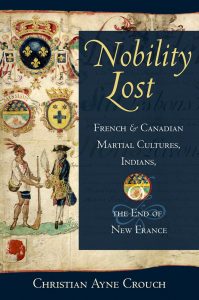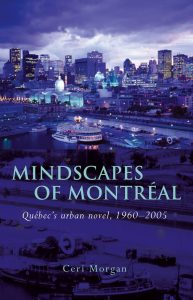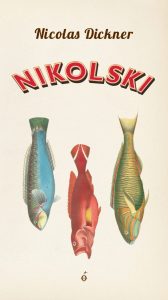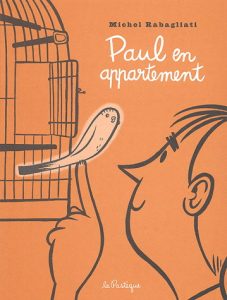It’s been a few weeks since I’m back from the Narrative2018 conference in Montreal, where I enjoyed a wide range of presentations and discussions in a variety of fields of the study of narrative – thanks for the inspiring ideas. And thanks, also, to everyone who commented on my paper, which dealt with “Futures of New York – Narrating Environmental Agency in Fiction and Non-fiction.”
As a researcher of cities, I’m glad I also found some time to get to know a bit of Montreal. Some thoughts here on the city and the books that communicated something of its past to me.
A first book I read was Christian Crouch’s Nobility Lost: French and Canadian martial cultures, Indians, and the end of New France (2014). It’s been some time I had been looking for a good, general history book about the Seven Years’ War in North America, and in Crouch’s book I found an eminently readable, fascinating study of the conflict, in particular in terms of different cultural perspectives on violence.
(By coincidence, I read the book immediately after reading a new translation of William of Tyre’s History of the Kingdom of Jerusalem, and was struck by some of the similarities – however far-fetched that may seem – between the narratives of violence and conflict in both books, especially in relation to differences between ”settlers” (and 2nd, 3rd generation) and ”newcomers” newly arrived from France; and different perspectives by both groups in terms also of alliances with indigenous / local nations.)
 A second book, specifically on Montreal, which I read with great interests, is Ceri Morgan’s Mindscapes of Montreal. My knowledge of Quebec and Montreal was extremely general, and my knowledge of the literature of Montreal basically non-existent. Morgan’s book provided an accessible, well-structured, and continuously though-provoking overview of the literature of Montreal in the period 1960-2005.
A second book, specifically on Montreal, which I read with great interests, is Ceri Morgan’s Mindscapes of Montreal. My knowledge of Quebec and Montreal was extremely general, and my knowledge of the literature of Montreal basically non-existent. Morgan’s book provided an accessible, well-structured, and continuously though-provoking overview of the literature of Montreal in the period 1960-2005.
Inevitably, a lot about the book reminded me of my own dissertation, about the Finnish-written literature of Helsinki in 1890-1940 – how to deal with literary representations in bilingual cities located at the periphery of continental geographies; what to select, how much to tell about historical and cultural specifities. Mindscapes of Montreal manages to be entertaining and informative to a general reader, as well as delving deep into more detailed analysis of specific novels. And it passed the test of every good literary urban studies book: it gives the reader the desire to go back to the city streets for new strolls, new discoveries; and also the desire to get to the book shops and get to know some of these books first-head. One of the (many) books I really wanted to pick up on the basis of Morgan’s book is Pierre Turgeon’ s Prochainement sur cet écran, which sounds as crazy as it sounds mesmerizing.
After rummaging through a variety of bookshops (so me with extensive Montreal/Quebec bookshelves and some none at all), I bought Nicolas Dickner’s Nikolski, which provided a poetic way to extend my stay in Montreal. Much to cherish here for anyone with an interest in cartography, maps, exile, expulsions, multiple ontological orientations, dirt, and urban archaeologies (the scene with the activist archeologist – several, in fact – practising guerilla dumpster diving is unforgettable). There’s also a lot that I wouldn’t have been able to relate to without Morgan’s book and Crouch’s book; the expulsion of the Acadians, for example, which features quite largely in the novel; the dislocations caused by the construction of Mirabel airport, which also has relevance; and the October Crisis.
me with extensive Montreal/Quebec bookshelves and some none at all), I bought Nicolas Dickner’s Nikolski, which provided a poetic way to extend my stay in Montreal. Much to cherish here for anyone with an interest in cartography, maps, exile, expulsions, multiple ontological orientations, dirt, and urban archaeologies (the scene with the activist archeologist – several, in fact – practising guerilla dumpster diving is unforgettable). There’s also a lot that I wouldn’t have been able to relate to without Morgan’s book and Crouch’s book; the expulsion of the Acadians, for example, which features quite largely in the novel; the dislocations caused by the construction of Mirabel airport, which also has relevance; and the October Crisis.
Lovely to note that Montreal seems to have a burgeoning comic book culture, with a considerable amount of volumes also set in Quebec and Montreal. Haphazardly I bought Paul en apartement by Michel  Rabagliati. One of the things that I noticed, especially when reading it next to Nikolski, was the undercurrent in both of these books of Belgian comic book classics – references, in both books to several Tintin classics; and in the Nikolski bookshop passage, with regular references to Bob Morane (the fictional book shops seems to have a whole section devoted to this Belgian French-written classic which also belongs to my youth culture strata).
Rabagliati. One of the things that I noticed, especially when reading it next to Nikolski, was the undercurrent in both of these books of Belgian comic book classics – references, in both books to several Tintin classics; and in the Nikolski bookshop passage, with regular references to Bob Morane (the fictional book shops seems to have a whole section devoted to this Belgian French-written classic which also belongs to my youth culture strata).
Hope to get back to Montreal in the future, for now I’ll continue spending time there with the mediation of books.


 A second book, specifically on Montreal, which I read with great interests, is Ceri Morgan’s
A second book, specifically on Montreal, which I read with great interests, is Ceri Morgan’s  me with extensive Montreal/Quebec bookshelves and some none at all), I bought Nicolas Dickner’s Nikolski, which provided a poetic way to extend my stay in Montreal. Much to cherish here for anyone with an interest in cartography, maps, exile, expulsions, multiple ontological orientations, dirt, and urban archaeologies (the scene with the activist archeologist – several, in fact – practising guerilla dumpster diving is unforgettable). There’s also a lot that I wouldn’t have been able to relate to without Morgan’s book and Crouch’s book; the expulsion of the Acadians, for example, which features quite largely in the novel; the dislocations caused by the construction of Mirabel airport, which also has relevance; and the October Crisis.
me with extensive Montreal/Quebec bookshelves and some none at all), I bought Nicolas Dickner’s Nikolski, which provided a poetic way to extend my stay in Montreal. Much to cherish here for anyone with an interest in cartography, maps, exile, expulsions, multiple ontological orientations, dirt, and urban archaeologies (the scene with the activist archeologist – several, in fact – practising guerilla dumpster diving is unforgettable). There’s also a lot that I wouldn’t have been able to relate to without Morgan’s book and Crouch’s book; the expulsion of the Acadians, for example, which features quite largely in the novel; the dislocations caused by the construction of Mirabel airport, which also has relevance; and the October Crisis. Rabagliati. One of the things that I noticed, especially when reading it next to Nikolski, was the undercurrent in both of these books of Belgian comic book classics – references, in both books to several Tintin classics; and in the Nikolski bookshop passage, with regular references to Bob Morane (the fictional book shops seems to have a whole section devoted to this Belgian French-written classic which also belongs to my youth culture strata).
Rabagliati. One of the things that I noticed, especially when reading it next to Nikolski, was the undercurrent in both of these books of Belgian comic book classics – references, in both books to several Tintin classics; and in the Nikolski bookshop passage, with regular references to Bob Morane (the fictional book shops seems to have a whole section devoted to this Belgian French-written classic which also belongs to my youth culture strata).